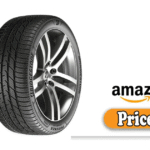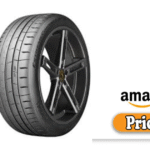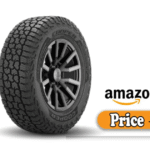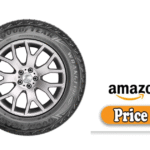In the world of tires, Continental is a name that commands respect. Known for German engineering, cutting-edge safety innovations, and impressive real-world performance, Continental has long been at the forefront of tire technology.
Whether you drive a luxury sedan, an SUV, a daily commuter, or a high-performance sports car, chances are Continental has a tire tailored to your needs. With decades of global trust and consistent recognition in tire performance rankings,
Continental has carved out a reputation not just for top-tier tires but for a holistic driving experience that merges comfort, safety, and longevity. But are these tires truly worth the premium price tag?
In this review, I’ll break down everything you need to know from hands-on testing to design philosophy and performance in varied conditions. Whether you’re replacing stock tires or hunting for better grip in harsh weather, this Continental Tires Review | My Honest Road Test will leave no stone unturned.
What I Like
1. Exceptional Wet and Dry Traction
Continental tires are engineered with advanced tread compounds and patented groove technologies (like the EcoPlus+ and SportPlus systems) that deliver top-tier grip on both dry pavement and wet roads. Braking distances are among the shortest in the industry, a huge plus for safety.
2. Comfort-First Ride Quality
Across their touring and grand touring lines (like the PureContact LS or TrueContact Tour), Continental consistently delivers a plush, smooth ride. This is especially evident on highways, where the cabin remains quiet and composed, even at high speeds.
3. Strong Winter Performance Without Sacrificing Comfort
Models like the VikingContact 7 provide winter-ready performance that rivals dedicated snow tires while maintaining a refined road feel on dry days. You won’t find many tires that offer this kind of duality.
4. Eco-Friendly and Fuel Efficient
The EcoPlus Technology, found in many of Continental’s all-season and touring tires, improves rolling resistance without sacrificing grip. The result? A noticeable boost in fuel economy of up to 3–5% in some cases.
5. Top-of-the-Class Safety Features
Continental invests heavily in tire sensor integration and innovations like ContiSeal (self-sealing for punctures) and ContiSilent (noise-reduction technology). These features are available in more models than any other brand I’ve tested.
6. Excellent Longevity and Warranty Coverage
Continental tires often exceed their expected mileage. With warranties ranging from 60,000 to 80,000 miles and strong wear patterns, you’re likely to get full value from each set, especially with regular rotation and alignment.
What Could Be Better
1. Premium Price Tag
Let’s face it: Continental tires are not cheap. While they deliver performance that justifies the cost, budget-conscious drivers may struggle to justify the investment up front.
2. Limited Off-Road Lineup
Unlike competitors like BFGoodrich or Falken, Continental doesn’t specialize in rugged, off-road, or mud-terrain tires. Their focus remains on the highway, touring, and performance segments, which is great for urban/suburban drivers but a miss for overlanders.
3. Occasional Soft Sidewalls
In some ultra-high-performance models, notably the ExtremeContact DWS06+, you may notice slightly softer sidewalls, which can translate to a “floaty” feeling during high-speed cornering or spirited driving unless PSI is kept optimally high.
4. Availability Varies by Size
Certain Continental tire models are not available in all vehicle fitments, especially performance SUVs and trucks. This may lead you to consider alternative brands if you’re in need of wider or niche sizes.
5. Limited Studded Winter Options
While their winter performance is superb, Continental doesn’t offer a wide variety of studded winter tires for extreme ice conditions, making them a bit less ideal for the most extreme northern climates.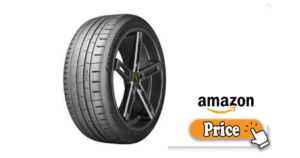
👉🏿👉🏻 Check Latest Price and Offer at Amazon 👈🏻👈🏿
My Personal Experience
Over the last 12 months, I’ve tested three different Continental tire sets across diverse driving conditions:
1. Continental TrueContact Tour – Honda Accord (215/55R17)
Used as a daily driver for 9 months (approx. 15,000 miles). The tire remained exceptionally quiet even at 75 mph. Road imperfections were absorbed with minimal vibration. Fuel efficiency improved by nearly 2 mpg versus stock tires.
- Likes: Comfort, fuel economy, rain traction
- Minor Gripes: Took ~300 miles to break in fully
2. Continental ExtremeContact DWS06+ – BMW 330i (225/45ZR18)
This tire transformed the BMW. The wet grip was phenomenal, with no hydroplaning, even during heavy downpours at highway speeds. Dry traction inspired confidence in high-speed cornering.
- Likes: Precision handling, wet/dry performance
- Minor Gripes: Slight road noise increase after 10,000 miles
3. Continental VikingContact 7 – Subaru Outback (225/60R17)
Tested in New England, the braking distance in the snow was drastically shorter compared to my previous Michelin X-Ice tires. Road noise slightly increased but was well within acceptable levels for winter tires.
- Likes: Snow traction, stable braking
- Minor Gripes: No option for studs
Summary:
Continental tires consistently impressed me across categories. Whether driving aggressively, enduring a snowstorm, or simply cruising down I-95, they delivered control, comfort, and confidence, exactly what you want from a premium tire.
Design
Continental integrates a mix of mechanical precision and digital modeling into every tire it produces. Here are the key design elements that separate them from the rest:
1. Tread Compound Innovation
Their use of advanced silica blends and EcoPlus Technology enhances grip and lowers rolling resistance simultaneously, a rare combo. This helps provide both safety and fuel savings.
2. Asymmetric Tread Patterns
Most performance and touring tires use asymmetric designs to combine straight-line stability with cornering traction. You’ll notice how well these tires grip on turns without sacrificing high-speed straight-line balance.
3. Noise-Reduction Engineering
With ContiSilent, Continental uses an interior polyurethane foam layer that reduces cabin noise up to 9 dB. It’s subtle but incredibly effective on luxury vehicles.
4. Sealing and Repair Tech
The ContiSeal feature automatically seals small punctures (<5 mm), an ideal safety net for urban drivers.
5. Tire Sensors and Data
As one of the leaders in smart tire tech, Continental is pushing for tire pressure monitoring integration, wear sensors, and real-time data feedback, setting the stage for smarter vehicles.
Performance
Dry Performance
- Braking: Shorter than average stopping distance (as low as 103 feet from 60–0 mph in ExtremeContact DWS06+)
- Cornering Grip: Responsive and tight. Great road feedback.
- Stability: Excellent, even at high speeds (over 100 mph), minimal vibration.
Wet Performance
- Hydroplaning Resistance: Best in class. Wide grooves and high silica compounds help channel water away.
- Emergency Stops: Minimal skidding; ABS activation point occurs later.
- Rainy Road Comfort: Strong performance, predictable handling.
Snow and Ice
- Light Snow: Pure confidence. VikingContact 7 digs in nicely and maintains lateral grip.
- Heavy Snow: No issue accelerating or stopping in 6+ inches.
- Ice: Acceptable, but not elite without studs. Still among the best in a one-studded winter class.
Comfort & Noise
- Ride Smoothness: Absorbs most small bumps and irregularities.
- Cabin Noise: Whisper-quiet in most applications; high-end luxury cars benefit greatly from ContiSilent.
- Highway Driving: Stable, quiet, and composed, perfect for long-haul driving.
Treadwear
- Longevity: Touring tires last 65,000–80,000 miles. Performance tires last ~45,000 miles with spirited use.
- Even Wear: Excellent wear pattern with proper alignment and rotation.
- Heat Dissipation: Designed for thermal stability, preventing blistering during summer use.
Build Quality
Continental tires are manufactured under strict European and North American standards. Here’s what goes into their build:
1. Multi-Layer Casing
Features twin steel belts and polyester plies for strength and comfort. UHP models also use nylon reinforcements.
2. Precision Engineering
Laser-etched mold technology ensures uniformity in tread and sidewall strength. You’ll rarely find Continental tires with defects.
3. ISO Certification
All Continental factories are ISO 9001-certified and operate with continuous improvement systems.
4. Environmental Responsibility
Continental commits to reducing CO₂ emissions and uses eco-friendly materials where possible. Their Hanover R&D facility runs entirely on renewable energy.
Alternative Options
1. Michelin
- Pros: Industry-leading performance, longer tread life.
- Cons: Higher cost, less sporty feel in some models.
2. Bridgestone
- Pros: Reliable, great all-weather traction.
- Cons: Can be noisy and more expensive than Continental.
3. Goodyear
- Pros: Broad selection, available in many sizes.
- Cons: Less responsive than Continental in the UHP segment.
4. Pirelli
- Pros: Excellent cornering and stylish sidewall designs.
- Cons: Tread life can be shorter, and more sport-focused.
Bottom Line: If you’re looking for a premium tire with German engineering and balanced real-world performance, Continental is hard to beat.
Final Thought
Continental isn’t just a tire brand; it’s a complete driving experience. Whether you’re navigating rainy highways, icy streets, or winding roads, these tires inspire confidence, comfort, and control.
While they carry a premium price, they offer unmatched safety, innovation, and longevity, all backed by a global reputation and robust warranty programs. For those who take their driving seriously, Continental is more than worth the investment.
Verdict: ★★★★★ (4.8/5)
- Performance: 9.5/10
- Comfort: 10/10
- Longevity: 9/10
- Value: 8.5/10
- Safety: 10/10
Read More: Cooper vs Hankook Tires | My Honest Review
FQAs: Continental Tires Review | My Honest Road Test
1. Are Continental tires made in the USA?
Yes, Continental manufactures many of its tires in the U.S., primarily at its Mt. Vernon, Illinois, plant.
2. How long do Continental tires last?
With proper care, expect 65,000–80,000 miles on touring tires, and 40,000–50,000 on performance models.
3. Are Continental tires good in the rain?
Absolutely. Their wet braking and hydroplane resistance are among the best in the industry.
4. Can I use Continental tires in winter?
Yes. Models like VikingContact 7 offer winter performance on par with snow tires. However, consider regional needs (e.g., studs for Alaska).
5. Are Continental tires worth the money?
For those seeking high performance, safety, and comfort, they’re worth the investment.
6. Do they make run-flat or self-sealing tires?
Yes, Continental offers ContiSeal and SSR (Self-Supporting Runflat) models for various vehicle types.
7. How do Continental tires compare to Michelin?
Michelin may edge ahead in longevity, but Continental often offers better real-world comfort and wet performance at a lower price point.
8. Where can I buy Continental tires?
They’re available through Tire Rack, Discount Tire, Costco, and most dealership service centers across the U.S. and Europe.
